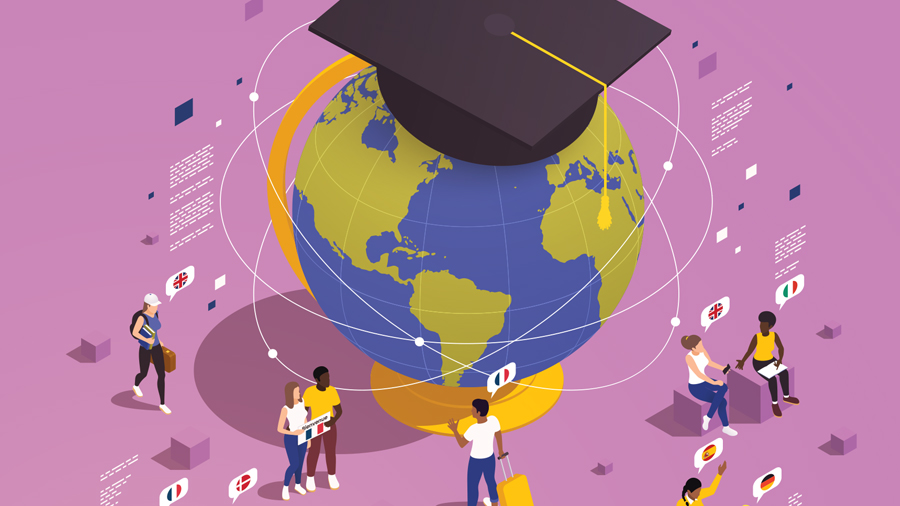International student programs are much more than study abroad opportunities. They connect people, cultures, and countries. When students travel to foreign lands, they act as ‘informal ambassadors’ of their home nations. Their friendships, interactions, experiences, and ideas often help strengthen diplomatic ties between countries.
Over the years, these exchanges have helped alter a country’s image and influence, and shift the perception and attitudes of international students towards the host country.
What is a Student Exchange Program?
Student exchange programs allow young individuals to live in another country for months or even years. These selected students study, volunteer, and interact with local communities. Such engagement helps break stereotypes, reduce misunderstandings, and build long-term goodwill between countries. Many times, the friendships and networks developed during student exchanges last a lifetime and influence future political and business decisions.
Student Exchanges – A Tool for Diplomacy Beyond Government
The term ‘diplomacy’ brings to mind images of negotiations, official meetings, world leaders, trade deals, and treaties. However, diplomacy isn’t limited to government and politics; it also occurs on a people-to-people level. And student exchanges serve as one of the most efficient ways to build this kind of people-based diplomacy.
Exchange students become cultural ambassadors by interacting with local communities, making friends, and experiencing life in another country. They share their traditions, values, and perspectives while learning about others. This immersion helps break stereotypes and boost mutual respect and admiration.
How Do Student Exchanges Influence Diplomacy?
Student exchanges influence diplomacy in several ways. Their effect can be seen in cultural understanding, soft power, leadership development, economic ties, and even global peace. Here are the specific areas where these programs leave a lasting impression.
Build Mutual Understanding
One of the most powerful impacts of international student exchanges is the way they build mutual understanding. Reading about another country in textbooks, watching it on TV, and exploring it on social media is very different from actually living there and gaining first-hand experiences.
Students who participate in exchange programs learn to appreciate diversity, adapt to new environments, and respect differences. Similarly, local communities gain exposure to different languages, customs, and worldviews. This two-way learning reduces biases and negative preconceptions and helps societies become more open-minded.
A Form of Soft Power
Governments often consider student exchanges as a tool of soft power, with the ability to attract and influence. When a country welcomes foreign students with cultural programs, scholarships, and supportive institutions, it builds a positive image of itself on the global stage.
If students enjoy their stay, they return with appreciation for the host country. This appreciation can influence their decisions in business, politics, or culture in the future. In this way, student exchanges quietly but effectively strengthen international relationships in ways that sometimes organised efforts of diplomacy cannot.
Creating Global Networks
During an exchange program, individual students not only connect with host communities but also develop networks of friendships and professional contacts. These networks can transform into valuable relationships later.
Many times, student exchanges lead to future researchers, entrepreneurs, policymakers, or diplomats. When these individuals require international collaboration, they often leverage the connections they created during their time abroad. Students planning to start a cross-border business, launch a joint research project, or promote cultural events can use their networks to tie nations closer together.
Economic and Diplomatic Benefits
Apart from culture and politics, student exchanges also benefit economics. Host countries earn from tuition fees, accommodation, and other living expenses paid by international students, thereby strengthening their economic conditions. These contributions boost local economies and create jobs.
In addition to these immediate economic benefits, student exchanges have long-term diplomatic gains. After returning home, students serve as unofficial ambassadors for their host country, promoting trade, tourism, and partnerships. Meanwhile, home countries benefit when their citizens return more skilled, open-minded, and globally connected.
Fostering Global Citizenship
International student exchanges also help in nurturing global citizenship. As students get the opportunity to live and learn in another country, these programs encourage them to develop empathy, adaptability, and a broader understanding of the world.
Many universities design exchange initiatives with this goal in mind, ensuring that students acquire knowledge and develop the mindset required to succeed in an interconnected global society.
The Impact of International Student Exchanges on Diplomacy: Conclusion
International student exchanges aren’t limited to academic opportunities. They are powerful diplomatic tools that build understanding, promote peace, and strengthen global partnerships. By living and learning abroad, students gain new perspectives, while host countries create a positive image that lasts for decades.
Most often, international relations are dominated by economics and politics. However, student exchanges act as a softer, human-centred approach. They highlight that diplomacy isn’t only about leaders and policies, it is also about people, friendships, and shared values.
Article by Gayatri Sarin

